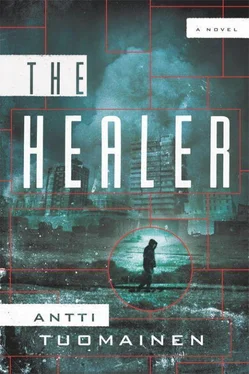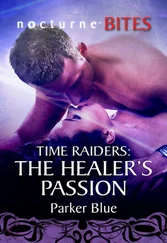So why was I so jealous?
And why did it feel so terrible?
I was jealous because I felt that something had been kept secret from me. But the jealousy felt unpleasant and crushingly petty. Families were being murdered, and I was fretting about whether my feelings should be hurt. It was humbling to realize I could be more childish and self-centered than I had ever imagined.
And the wretched feeling wasn’t helped by the fact that now, with jealousy burning inside me and paranoia flowing freely, my eyes were drawn to the glowing, inviting e-mail icon on Johanna’s computer screen.
Jaatinen’s face was wet from the rain, red from the sea wind, and, it seemed to me, purposely inscrutable. We were standing on the sea side of Jätkäsaari, a couple of hundred meters north of the place where my ribs and back had got a taste of the security guards’ clubs and boots. The wind pushed its cold claws under my parka and through the fabric of my pants, then gusted away. I would have been shivering with cold if I wasn’t already shaking from shock.
Moments earlier, Jaatinen had taken me to the six-story waterfront building behind us, to an open, clean, quietly tasteful penthouse apartment where a banker and his family lay murdered.
Jaatinen looked at the sea, searching for something in the gray-green surface of the water and looking more like he was postponing what he had to say than pondering it.
What can a person say in a situation like that? A lot, no doubt, but words escaped me. I had never seen anything like it. And nothing can prepare you for it. Nothing, I said to myself.
“The reason I asked you to come here, of course, is our suspicion of Tarkiainen. To find out the new information you have on him.”
I told him about my visit to Tarkiainen’s former hangout, about my theories concerning him, and my conversations with people who knew him.
“It’s all unofficial, of course,” Jaatinen said.
“Of course,” I said, and swallowed.
No matter how hard I tried to put the murder scene out of my mind, I couldn’t. The bloodied hair, the bedding, the dark stains on the wall, the small bodies under the blankets. What had they been thinking about when they went to bed? The games they played that day? Opening presents?
“How did they—” I began, not knowing how to put it. “How did they keep sleeping with someone walking around shooting at them?”
“That’s exactly the reason that Tarkiainen is the name we’re most interested in. He knows something about medicine. He probably knows what to use to make a person sleep, and how to administer it. But we won’t know for sure until the lab tests and technical investigation is complete. And as I said, we’re somewhat at a loss with our staff shortage, although this case is serious enough that it’ll be a high priority, I think. Things being as they are, we won’t get an answer for a few days, in any case, perhaps a few weeks.”
His voice faded off. I didn’t know how to continue, so I just waited for him to take up the thread again. There was a boat dock ahead on the right behind a high fence topped with barbed wire. The long, narrow dock was empty now. It stretched out its light-brown arm toward the sea as if beckoning to someone. On the other side of the barbed wire was a guard’s booth the size of a summer cabin that would be manned again when spring came, assuming that there were enough people in the area of sufficient means to afford a boat.
“This is purely hypothetical, of course,” Jaatinen said when we’d been quiet for altogether too long, considering the bile rising in my throat, the stinging wind that had us at its mercy, and the general panic I was feeling.
“And absolutely unofficial,” I managed to say.
“That goes without saying,” Jaatinen said. “In theory the order of events might have been as follows: Suppose someone in the family needs a doctor. They go online and request a doctor visit. Someone on the lookout for that very thing diverts or intercepts their message. Pasi Tarkiainen shows up and says he’s the doctor. He uses a false name, since anyone can check online databases and see that there is no one named Pasi Tarkiainen who’s a doctor, that, in fact, Pasi Tarkiainen has been dead for years. But keep in mind that that’s exactly what people don’t do—they don’t check things out, even when their own health or safety is at stake. That’s one way that things haven’t changed.”
He took a breath and seemed to gather his thoughts, squeezing the bridge of his nose between his thumb and forefinger. I saw the bloody sheets again, the puddle of congealed blood under the child’s bed, the bloody tuft of hair on the white surface of the night table.
“Tarkiainen pretends to be a doctor, examines the patient as he ought to, prescribes medication, and then tells them that now would be a good time to inoculate them all against malaria or something. Who would say no, if a doctor suggested it? He inoculates them, but not with what he said exactly. He gives them some kind of long-lasting sedative that doesn’t take effect right away. A few hours later, the one who does the dirty work has a clear path. He gets the door code from Tarkiainen, maybe even a key card, gets into the apartment, where they’re all asleep, and—”
“Shoots them, one by one,” I said.
“Yes.”
We stood another moment in the thrashing wind. The cement-gray sky rose from the horizon over our heads up into invisibility. A black and brown mongrel dog ran along the beach alone. A few gray and white gulls moved lazily, dutifully out of its way.
“That’s quite a hypothesis,” I said.
“Just a hypothesis,” Jaatinen answered.
“But knowing what we know now…”
“Exactly. Maybe it’s not just a hypothesis,” he said, nodding. “There’s a warrant out for Tarkiainen’s arrest. It doesn’t mean anything, practically speaking, but he doesn’t know that. Maybe it’ll ring some bells somewhere. It’s not terribly likely it will, but at the moment it feels like Tarkiainen’s not nearly as dead as he was a little while ago.”
Jaatinen took out a cotton handkerchief and wiped his eyes. We were quiet again. We were getting used to that. He stuffed the handkerchief back in the pocket of his beige overcoat and straightened up to his full height.
“I have to ask,” I said. “Why did you show that to me? Why did I need to see the heads blown to pieces and the puddles of blood under the bed?”
He looked at me.
“You wanted to be a part of this,” he said, and turned to face the sea.
I watched him and thought at first that he was looking at some specific point, trying to get a glimpse of something. But his gaze only seemed to be aimed at the horizon. It actually was falling like a stone into the water, somewhere far out at sea.
“And you’re on Tarkiainen’s trail. It’s better if you know what it is we’re talking about. You’re quite close.”
He dropped his gaze again until it barely reached the water’s edge.
“But think about this. Whenever some lunatic gets it in his head that a few individuals are responsible for the world falling apart around him, we go after him. And what happens when we catch him? Some new lunatic comes along, and the world keeps marching toward destruction. That’s nothing new, of course. History tells us that this kind of thing has happened many times before. Civilization blossoms and then it falls. It’s happened on this planet in our own lifetime, to millions and millions of people, even before now. But you take it harder, somehow, when it’s your own little world that’s dying. Don’t you, Tapani?”
“I guess so.”
A large black-hulled boat appeared on the open sea, on its way to somewhere. I watched it for a moment, then I saw the blood again, the blankets, the little head of brown hair, broken in two. Evil and senseless. I couldn’t see anything else. I had to get away.
Читать дальше












